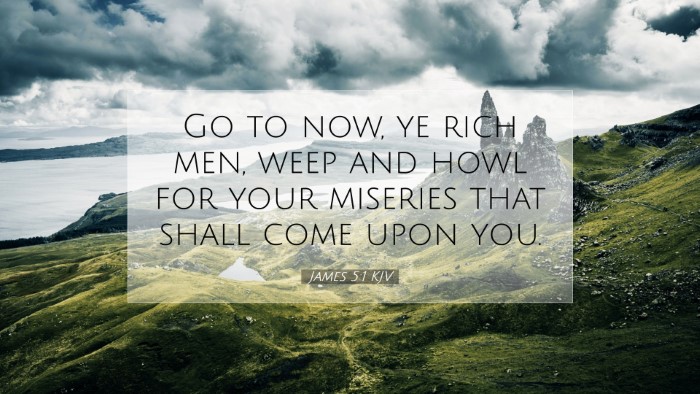Old Testament
Genesis Exodus Leviticus Numbers Deuteronomy Joshua Judges Ruth 1 Samuel 2 Samuel 1 Kings 2 Kings 1 Chronicles 2 Chronicles Ezra Nehemiah Esther Job Psalms Proverbs Ecclesiastes Song of Solomon Isaiah Jeremiah Lamentations Ezekiel Daniel Hosea Joel Amos Obadiah Jonah Micah Nahum Habakkuk Zephaniah Haggai Zechariah MalachiJames 5:1
James 5:1 KJV
Go to now, ye rich men, weep and howl for your miseries that shall come upon you.
James 5:1 Bible Commentary
Commentary on James 5:1
James 5:1 states, "Go to now, ye rich men, weep and howl for your miseries that shall come upon you." This verse serves as a profound admonition to the rich, emphasizing moral and spiritual accountability. Below, we draw insights from notable public domain commentaries to uncover the implications of this passage.
Overview of Wealth and Misery
James addresses the wealthy not with an exhortation to charity, but a summons to lament. The focus is on the impending sufferings that wealth can bring when it is amassed unjustly or without regard for the plight of others.
Matthew Henry’s Perspective
Matthew Henry emphasizes that James' warning serves as a wake-up call. He argues that wealth, if obtained through injustice or misused, ultimately leads to misery.
- Wealth as a Source of Sorrow: Henry highlights that the rich must recognize the temporal nature of their riches and the eternal ramifications of their actions.
- Call to Repentance: He suggests that the rich should not only weep for the future miseries but also engage in genuine repentance for their current state of heart and conduct.
Albert Barnes’ Insights
Albert Barnes provides an analytical approach, dissecting the social and theological context of the epistle. He notes that wealth often creates a false sense of security.
- Warning of Judgment: Barnes affirms that the wealthy are warned of consequences for their poor treatment of the less fortunate, as well as for their pride and self-sufficiency.
- Temporal vs. Eternal Wealth: He juxtaposes the fleeting nature of earthly riches against the enduring spiritual riches found in faith and humility.
Adam Clarke’s Commentary
Adam Clarke dives deep into the historical context, identifying the socio-economic struggles of the early church. He notes the plight of the oppressed juxtaposed with the extravagant lifestyles of the wealthy.
- Social Responsibility: Clarke contends that the epistle not only addresses personal accountability but also the systemic injustices that wealth can perpetuate.
- Future Judgments: He underscores that the "miseries" referred to are not just imminent but also tied to eschatological judgments that align with God’s justice.
Theological Implications
This verse poses critical theological questions regarding the nature of wealth. Is wealth inherently evil? How should Christians engage with worldly riches? The commentaries suggest that wealth, while not sinful in itself, becomes a perilous snare when it overshadows one's devotion to God and the welfare of others.
Warnings Against Materialism
Across these commentaries, a common theme emerges: the dangers of placing trust in riches. The sense of urgency in James' admonition implores believers to re-evaluate their priorities and their attachment to material possessions.
Affections Set on High
All three commentators remind us of Colossians 3:2, which admonishes believers to set their affections on things above rather than on things on the earth, highlighting a crucial paradigm shift from worldly dependence to divine reliance.
Practical Applications for Today’s Believers
- Awareness of Social Justice: The text calls today’s believers to engage in social justice and equitable treatment, ensuring that wealth does not come at the expense of the vulnerable.
- Encouragement of Generosity: Rather than hoarding wealth, believers are urged to practice generosity, reflecting Christ's heart for the marginalized.
- Preparation for Accountability: The warning should motivate believers to hold themselves accountable for their financial stewardship.
Conclusion
James 5:1 serves as a sobering reminder of the moral implications of wealth. Through the lenses of Matthew Henry, Albert Barnes, and Adam Clarke, we find a cohesive message urging rich men to heed the coming miseries as a call to repentance and increased awareness of their social responsibilities. True riches lie not in material accumulation, but in the stewardship of resources aligned with God’s will and purposes.


